Taiwan's contemporary art scene is active and international with many opportunities for local artists to participate in exhibitions abroad while holding dialogues with foreign artists at local exhibitions.
Young Taiwanese artist Wu Chi-Tsung (
Wu, whose work is noteworthy for its exploration of imagery via video, photography and mechanical instal-lation, is currently exhibiting his art for the first time in the UK at the Artes Mundi exhibition that ends on May 7.
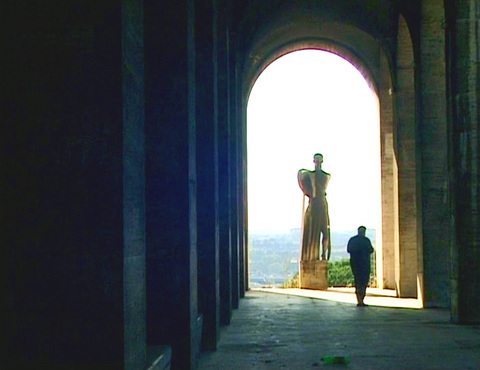
PHOTOS COURTESY OF THE ARTIST
The eight selected artists -- from India, Finland, South America, Europe and Taiwan -- are regarded as having made significant contributions to the world's understanding about the human condition. The prize will be awarded to one of the selected artists on March 31.
In 2004, New York-based Chinese artist Xu Bing received the first award for his work Where Does The Dust Collect Itself, made from dust collected from the streets in Manhattan after Sept. 11.
Besides the US$40,000 prize money, the winning artist's work will be exhibited at a major show and purchased for national collections.
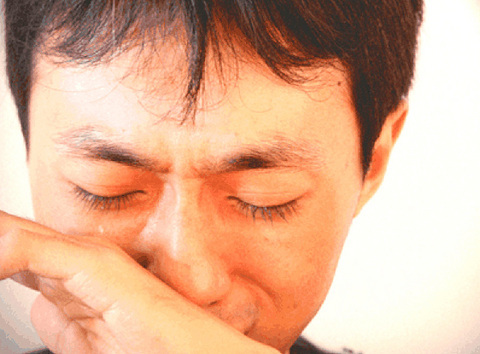
Currently on view at the German Cultural Center in Taipei is a modest, yet poignant exhibition of German and Taiwanese artists titled Intimate Relations. Curator/artist Andreas Walther is no stranger to Taiwan as he has been living, exhibiting and cura-ting here for several years and is therefore familiar with lifestyles both in Cologne and Taipei.
The videos, photographs and drawings explore the theme of closeness between people and provocatively ask if there are cultural differences between Western and Eastern personal relationships.
Some of the art on view seems to act like a sociology experiment. This is most notable in Andreas Walther's riveting video Family Portraits, in which a video camera runs for 10 minutes, while the invited family members (who were instructed not to speak to each other while seated in the studio facing a large mirror) fidget, giggle, and non-verbally interact with each other.
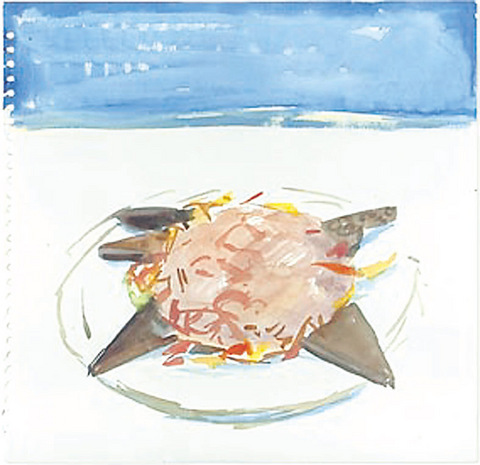
PHOTO COURTESY OF THE ARTIST
Sometimes with conceptual art, a background explanation is required in order to comprehend the art. To fully understand Chen Ting-yu's He Cried it is necessary to read about his concept beforehand. There are two see-mingly identical photos of a close-up of a man's face wiping away tears from his eyes. Chen photographed himself crying, as this was part of his experience of being involved in an intimate love relationship. Then he photographed his boyfriend mimicking his action.
However, his boyfriend couldn't fake the tears.
Chen's two portraits show that even with an intimate partner we can achieve simulations of closeness but achieving actual oneness is nearly impossible.
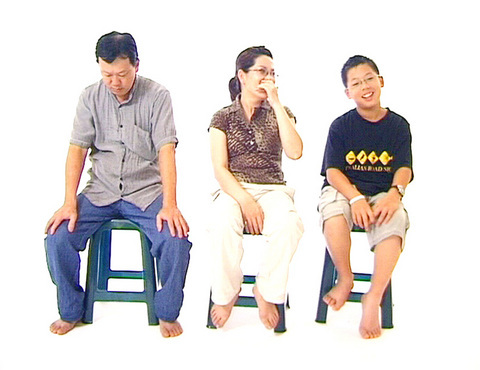
Another conceptual work is Cologne-based artist Cony Theis' Familienportrait. With her mother, sister and two nieces, the five female family members painted a series of watercolors together.
Chen Shun-chu's (陳順築) Journeys in Time is a photographic series where he uses the family snapshot in a similar way to the Proustian madeleine to recapture the idyllic past of his childhood.
Juergen Heiter's film The Place in the Woods is interesting, but due to its German soundtrack there are limits for the audience. The architecture of Rome and Paris serves as a backdrop to tell a story about modernity, while in the foreground couples try to make relationships work even though intimacy is glaringly absent.
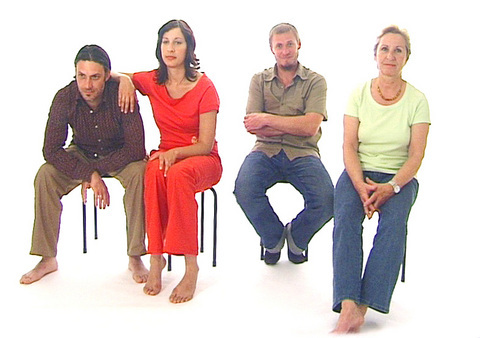
Art Notes:
What: Intimate Relations
Where: German Cultural Center, 12F, 20 Heping W Rd, Sec 1, Taipei (
When: To April 20
Tel: (02) 2365 7294

As Taiwan’s second most populous city, Taichung looms large in the electoral map. Taiwanese political commentators describe it — along with neighboring Changhua County — as Taiwan’s “swing states” (搖擺州), which is a curious direct borrowing from American election terminology. In the early post-Martial Law era, Taichung was referred to as a “desert of democracy” because while the Democratic Progressive Party (DPP) was winning elections in the north and south, Taichung remained staunchly loyal to the Chinese Nationalist Party (KMT). That changed over time, but in both Changhua and Taichung, the DPP still suffers from a “one-term curse,” with the

William Liu (劉家君) moved to Kaohsiung from Nantou to live with his boyfriend Reg Hong (洪嘉佑). “In Nantou, people do not support gay rights at all and never even talk about it. Living here made me optimistic and made me realize how much I can express myself,” Liu tells the Taipei Times. Hong and his friend Cony Hsieh (謝昀希) are both active in several LGBT groups and organizations in Kaohsiung. They were among the people behind the city’s 16th Pride event in November last year, which gathered over 35,000 people. Along with others, they clearly see Kaohsiung as the nexus of LGBT rights.

Jan. 26 to Feb. 1 Nearly 90 years after it was last recorded, the Basay language was taught in a classroom for the first time in September last year. Over the following three months, students learned its sounds along with the customs and folktales of the Ketagalan people, who once spoke it across northern Taiwan. Although each Ketagalan settlement had its own language, Basay functioned as a common trade language. By the late 19th century, it had largely fallen out of daily use as speakers shifted to Hoklo (commonly known as Taiwanese), surviving only in fragments remembered by the elderly. In

Dissident artist Ai Weiwei’s (艾未未) famous return to the People’s Republic of China (PRC) has been overshadowed by the astonishing news of the latest arrests of senior military figures for “corruption,” but it is an interesting piece of news in its own right, though more for what Ai does not understand than for what he does. Ai simply lacks the reflective understanding that the loneliness and isolation he imagines are “European” are simply the joys of life as an expat. That goes both ways: “I love Taiwan!” say many still wet-behind-the-ears expats here, not realizing what they love is being an